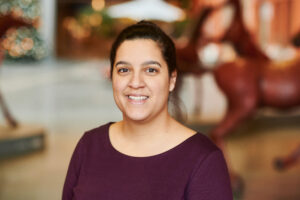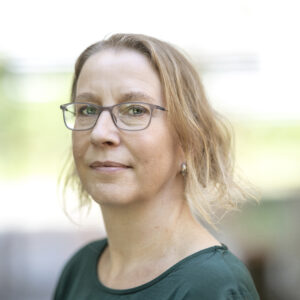Vote for the staff delegation of the Faculty Council!
List Pegel
Voting is open from Monday 12 to Wednesday 14 May 2025

Lonneke van Tuijl (Assistant Professor Psychology, section Clinical Psychology).
“Where do we actually want to go from here?”
My name is Lonneke van Tuijl, assistant professor in Clinical Psychology. A very Dutch name, but I only came to live in the Netherlands when I was 24. As such, internationalization is a topic close to my heart. Our international colleagues have to get used to a new work place and culture – day in, day out. How can we better support them? And what can we learn if we look critically at our own norms? Why do we do things the way that we do them – and do these ways still make sense?
As teaching innovation ambassador and coordinator in the faculty honours program, I see the added value of teaching that adapts to the latest developments, but still has room for the individual. At the same time, I see how efficiency is becoming increasingly the norm and the goal. How, then, can we make sure that there is still room for innovation and personal growth?
How can we respect our own limits, without compromising our career prospects? Why are passionate and knowledgeable teachers, who contribute so much to our programs, still without a permanent contract? As member of the faculty council, I will ask these questions and keep asking: Why does it need to be this way, and what are we aiming for?
 Stefanie Nelemans (Associate Professor Education and Pedagogy, section Youth and Family)
Stefanie Nelemans (Associate Professor Education and Pedagogy, section Youth and Family)
“Recognition, job satisfaction, and professional growth”
My name is Stefanie Nelemans, Associate Professor (UHD) in the section Youth and Family of the Department of Education and Pedagogy. I have been affiliated with Utrecht University for many years, and I greatly enjoy focusing my teaching and research on the psychosocial development of adolescents.
Alongside these core responsibilities, I have gained broad experience within our faculty through roles such as member of the Educational Committee of the FSBS Research Master’s programs, board member of the FSBS PhD program Child and Adolescent Studies (CAS), and board member of our FSBS U(H)D council. These positions have further sparked by interest in the governance and organizational aspects of the university and our faculty.
It is with this in mind that I am pleased to stand for election to the Faculty Council, to contribute in an open-minded and critical manner to discussions about the vision and direction of our faculty. Topics that I feel strongly about include TRIPLE, Recognition & Rewards, workload and job enjoyment/well-being, and the professional development of colleagues across the faculty. I look forward to representing the interests of my FSBS-colleagues as a member of the Faculty Council!

Anouk Smeekes (Associate Professor Youth Studies, section Interdisciplinary Social Science).
“A place where everyone feels heard“
Our faculty is constantly evolving and strives to be a place where everyone feels at home and works with joy. I am eager to actively contribute to this by standing for election to the Faculty Council. Since 2009, I have worked at FSS in various roles: as a lecturer and researcher, co-promotor, member of the Bachelor Examination Committee, member of the ISS Department’s Management Team, and as an EDI officer.
Through these diverse experiences, I have come to know the faculty well and can represent different perspectives when advising the faculty board. An important principle for me is approachability. Colleagues from across the faculty are welcome to share issues with me that they would like to bring to attention within the faculty.
Other key areas of focus for me are: an inclusive learning and working environment, work pressure, recognition and appreciation, and sustainability. I believe it is important for the faculty to continue developing policies that address the growing diversity in the backgrounds and views of our students and staff, and that contribute to reducing work pressure, increasing transparency in promotions, and promoting environmentally responsible behavior.
With your vote and input, I can raise these and other important issues, advocating for your interests.
 Kirsten Buist (Associate Professor Education and Pedagogy, section Clinical Child and Family Studies)
Kirsten Buist (Associate Professor Education and Pedagogy, section Clinical Child and Family Studies)
“For quality and job satisfaction in teaching and research“
I work as an Associate Professor in Pedagogy and have been a member of the Faculty Council of the Faculty of Social and Behavioural Sciences (FSBS) since 2013. In my previous terms, I have actively worked – together with my fellow council members – to address workload issues, advocate for more permanent positions for (clinical) lecturers, and promote diversity and inclusion.
I want to continue contributing to a faculty where the quality of teaching and research, as well as job satisfaction, are central. Especially in times of scarcity and increasing challenges, I believe it is essential to pay attention to the needs of both staff and students.
With your support, I would be happy to continue this work over the coming two years!
 Ellen Reitz (Assistant Professor Education and Pedagogy, section Clinical Child and Family Studies)
Ellen Reitz (Assistant Professor Education and Pedagogy, section Clinical Child and Family Studies)
“Decision-making with support starts with your vote”
Since 2004, I have been working at Utrecht University in various roles – as a researcher, lecturer, member/chair of the educational committee (OC), member of the Board of Examiners, and currently as chair of the Faculty Council. These diverse experiences have allowed me to understand the faculty from multiple perspectives and to approach policy and decision-making accordingly. Transparency, careful decision-making, and attention to the working environment are key priorities for me. Faculty policies must take into account the impact on all staff, both academic and non-academic.
As chair of the Faculty Council, I strive to bring forward colleagues’ concerns, to advise and think along with the faculty board, and to take a critical stance. In the coming period, we face major challenges in the areas of education and research, including financial pressures. Topics such as the quality of education and research, workload, promotion policies, TRIPLE, and Recognition and Rewards require ongoing attention. These issues call for a Faculty Council that is both critical and constructive—one that keeps the board alert and ensures that the voice of staff is heard.
With your vote, I hope to continue this work and remain a committed, critical partner whorepresents your interests.
 Martijn Mulder (Assistant Professor Psychology, section Experimental Psychology)
Martijn Mulder (Assistant Professor Psychology, section Experimental Psychology)
“Balance, engagement, and a future-proof faculty“
As a member of the Faculty Council, I am committed to promoting equality between research and teaching, and to enabling a flexible balance between the two. Different types of appointments sometimes require tailor-made solutions in order to safeguard both the quality and availability of our academic work.
In addition, I focus on the role our faculty plays in the development and teaching of AI, which is becoming increasingly important in society. How can we implement AI responsibly? How do we interact with these systems? What are the possibilities, and where should we draw the line? These are questions our faculty must actively engage with – and in which we can take a leading role.
All of this, of course, starts with listening: to students and staff, both academic and support. I aim to represent their voices, bring forward what matters for everyone’s work environment, and feed this back into the conversations with the faculty leadership. In this way, I use my position on the Faculty Council to push for real change.

Noémi Schuurman (Assistant Professor Social Sciences, section Methodology and Statistics).
“Transparent policies that work“
I am an assistant professor at the Methodology & Statistics section, and have been active in the faculty council for four years now. I joined the council to be able to critically reflect on how things work in our faculty together with the people that govern it, to affect change from the inside out.
I personally value that the faculty’s policies reward careful, critical, high-quality teaching and research (slow science, quality over quantity). Moreover, that those policies are well-founded, transparent and – of course- effective.
Examples of what I have worked for during my time in the council: Permanent positions for teachers including those that do not hold a PhD; Rewarding more diverse profiles for staff; (more) fair/efficient ways of distributing internal grants; policies that support diversity, inclusivity, social safety; (more) transparent promotion/advancement policies; sensible and understandable examination regulations; input for employees and students on the van Unnik building designs; that policies that are put in place are evaluated in their effectiveness.

Sanne de Bos (Department Manager, Social Sciences, section Sociology)
“Transparency, balance, and thoughtful decision-making”
My name is Sanne de Bos, Department Manager of Sociology and a member of the Faculty Council of the Faculty of Social and Behavioural Sciences (FSBS) for the past two years. My curiosity about what’s going on in other departments and how decisions are made at the faculty level led me to join the council. Together with the other council members, we provide both solicited and unsolicited advice to the faculty board on a wide range of topics, and discuss policies related to education, research, finance, HR, and organizational matters.
Topics that I find particularly important include the implementation of HR policy, financial policy, and careful, transparent decision-making. Does our HR policy take into account both academic and support staff? How are finances distributed, and how are we handling budget cuts within the faculty? Are important developments communicated clearly and in a timely manner?
In the coming two years, I hope to continue representing the interests of all my colleagues within the Faculty Council.

